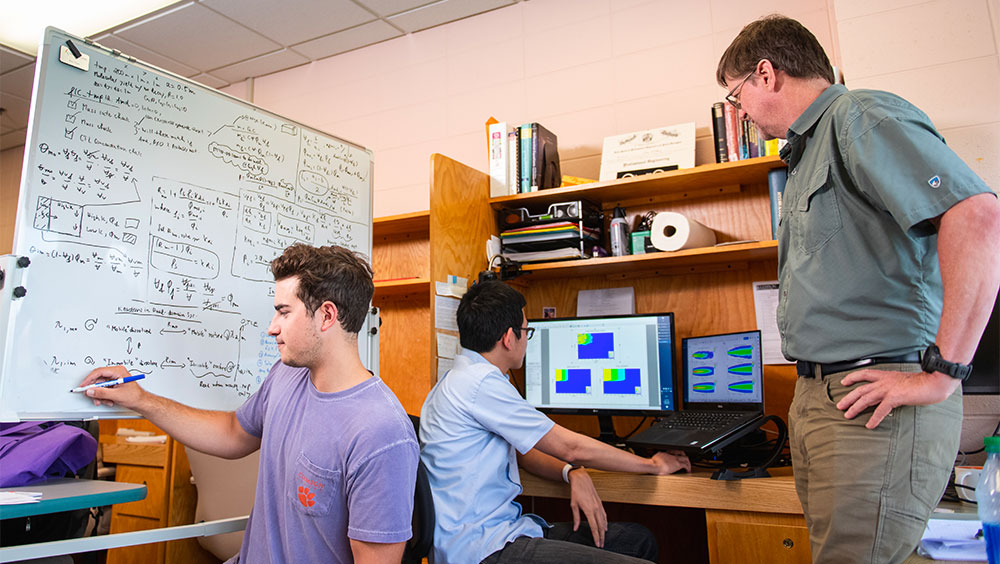
Testing the Waters

Ron Falta’s mathematical models are helping regulators and consultants figure out what it will take to remediate polluted groundwater.
Pouring a cool glass of clean drinking water is so common it’s often taken for granted in the developed world, but it’s possible only because of people like Clemson University’s Ron Falta.
Falta has devoted a significant part of his three-decade career at Clemson to helping ensure groundwater stays pollution free. He has also contributed to the body of research into sequestering carbon dioxide to combat climate change.
His peers are taking notice.
Over the past year and a half, the professor of environmental engineering and Earth sciences has racked up three awards recognizing his accomplishments.
“It’s satisfying, and I’ve always enjoyed producing tools other people can use,” Falta said. “Clean drinking water is critical. Now we’re moving into other critical areas related to climate, and there are going to be new challenges in those areas for people to work on.”
Falta has made some of his biggest strides in helping treat groundwater contamination. His mathematical models predict where water will go and how different clean-up methods will work in the groundwater systems.
Falta has developed two types of models. The more complicated type, multi-phase flow models, are used by national-laboratory research scientists and graduate students.
A simplified version, REMchlor, is distributed by the U.S. Environmental Protection Agency to help regulators and environmental consultants figure out how long it would take to clean up sites using different cleaning activities. REMchlor stands for “remediation, evaluation and modeling of chlorinated solvents.”
“It’s easy to use, but it solves a problem that’s pretty complicated,” Falta said. “This was a much quicker way to get an answer that was 90% correct as opposed to spending way, way more time to get an answer that was only slightly better.”
Clean drinking water is critical. Now we’re moving into other critical areas related to climate, and there are going to be new challenges in those areas for people to work on.
Ron Falta, Professor — Environmental Engineering and Earth Sciences
Falta has also researched greenhouse gas control, a topic that first interested him about 15 years ago.
It is possible but expensive to capture carbon dioxide from flue-gas streams at coal-fired power plants, he said. The carbon dioxide would be compressed, sent down a pipeline to a suitable spot and injected into the ground.
Falta’s contribution has been to examine what would happen to the carbon dioxide underground under different conditions.
“The idea is it’s a partial solution as we transition away from fossil fuels,” he said. “We’d still be able to use some fossil fuels but capture the carbon dioxide emissions and store them geologically.”
David Freedman, chair of the Department of Environmental Engineering and Earth Sciences, said that Falta is a highly accomplished and influential researcher in his field.
“Ron has dedicated his career to studying contaminant transport and remediation,” Freedman said. “He has made important contributions to understanding how pollutants behave in complex groundwater systems, many of which are used as drinking water sources. I offer him my deepest congratulations on his recent awards. Each is well deserved.”
The American Academy of Environmental Engineers and Scientists awarded Falta the 2020 University Research Award. The National Ground Water Association honored him with the 2020 John Hem Award. Falta also received the Clemson University Research, Scholarship and Artistic Achievement Award.
Falta said that of all his accomplishments, he is most proud of his students, who have gone on to careers with national labs, universities, state and federal regulators and environmental consultancies.
He currently has three master’s students and one Ph.D. candidate working in his lab.
Kien Pham, the Ph.D. candidate, is researching matrix diffusion, a process in which contaminants pollute the groundwater. With Falta, Pham is working to create a model that captures the process.
“Dr. Falta is the No. 1 or No. 2 researcher in remediation, and that’s why I decided I wanted to do my master’s and Ph.D. at Clemson,” Pham said. “He has a lot of industry experience that matches with mine. His research is very practical, very hands-on.”
Justin Trainor, a first-year master’s student, has taken two courses with Falta and is just starting research into borehole thermal energy storage with Falta as his advisor. Trainor’s long-term plans are to go into environmental consulting and work on thermal remediation.
“I didn’t see myself going into graduate school until I got introduced to the program and the faculty here,” Trainor said. “It really is an amazing program, and I’d recommend it to anyone.”